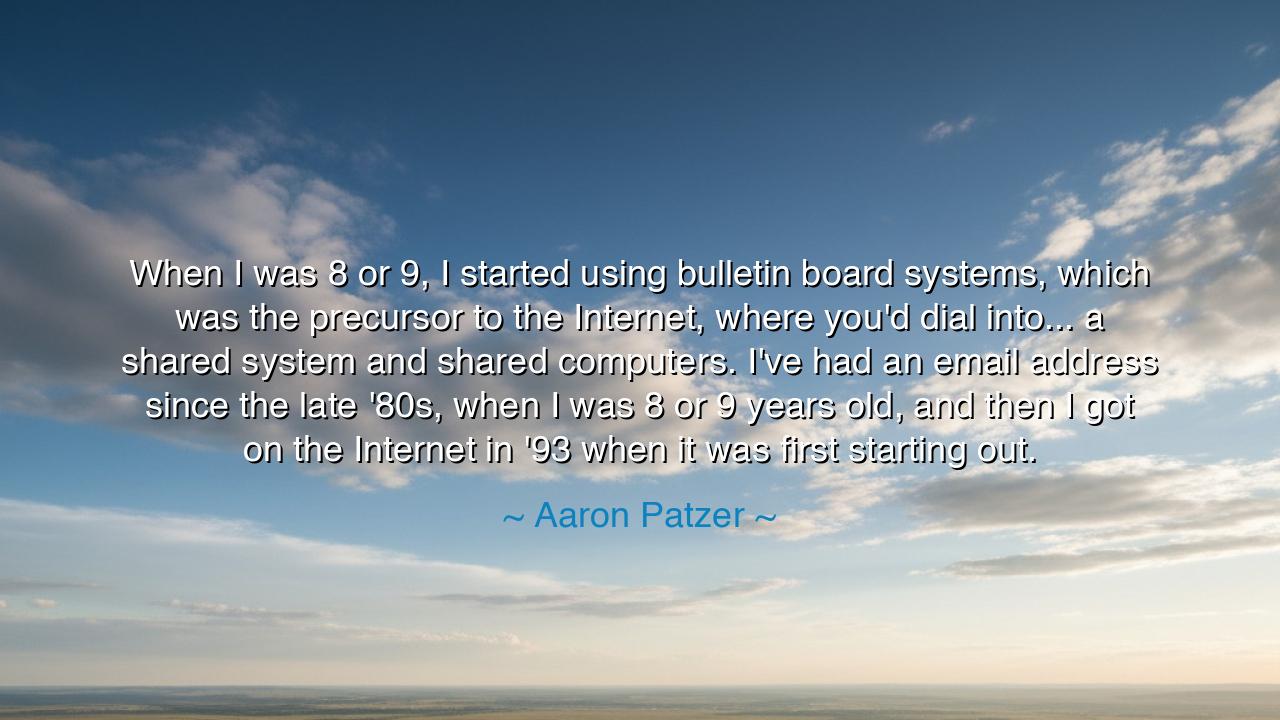
When I was 8 or 9, I started using bulletin board systems, which
When I was 8 or 9, I started using bulletin board systems, which was the precursor to the Internet, where you'd dial into... a shared system and shared computers. I've had an email address since the late '80s, when I was 8 or 9 years old, and then I got on the Internet in '93 when it was first starting out.






“When I was 8 or 9, I started using bulletin board systems, which was the precursor to the Internet, where you'd dial into... a shared system and shared computers. I've had an email address since the late '80s, when I was 8 or 9 years old, and then I got on the Internet in '93 when it was first starting out.” — in these words, Aaron Patzer, the visionary founder of does more than recount a childhood memory. He testifies to the dawn of an age — the birth of digital civilization, when humanity first began to weave its consciousness into the web of machines. Beneath his tone of recollection lies the pulse of revolution: a time when the seeds of the modern world were sown by children who saw possibility where others saw mere circuits and static.
Patzer’s words carry the wonder of first discovery, the moment when imagination meets technology and awakens destiny. In his youth, when most played in fields or streets, he played within the invisible realms of connection — those early bulletin board systems (BBS) that bridged minds across miles of wire. To dial into another computer was, in that time, an act of almost mythic adventure: the sound of the modem was the trumpet of exploration, and the flicker of text across a screen felt like touching the future. He belonged to a generation of pioneers — not of continents or oceans, but of information itself.
To understand the depth of his words, we must remember that this was a time before the Internet became the ocean of life it is today. The BBS was small, humble, fragile — a flickering network of shared systems where ideas flowed in silence, carried by patience and curiosity. Every connection required intention, every message effort. Yet from these primitive exchanges arose the culture of the digital world: collaboration, open access, and the quiet belief that knowledge, once shared, could transform humanity. Patzer’s early immersion in this world forged not only a technologist, but a philosopher of connectivity — one who saw that computers were not cold tools, but bridges of human thought.
History, too, has seen other moments when a child glimpsed the horizon before the world did. Thomas Edison, at the age of twelve, sold newspapers on trains, yet used the profit to buy chemicals for his experiments. His curiosity became the foundation of electric light. Alan Turing, fascinated by logic and pattern in youth, grew to shape the age of computation. Like them, Aaron Patzer’s boyhood curiosity was not trivial — it was the spark that foresaw an era where technology and daily life would merge into one fabric of being. His story reminds us that revolutions often begin not in laboratories, but in bedrooms, with a curious child and a humming machine.
But beyond nostalgia, there is also a warning hidden in his reflection. The world that began as shared discovery has become a storm of noise, distraction, and division. The early Internet was built on patience, curiosity, and connection — the slow joy of learning. Today’s Internet, bound by speed and spectacle, too often forgets its soul. Patzer’s words call us to remember the original spirit of the digital age: that the machine was meant to connect minds, not isolate them; to share wisdom, not scatter it.
The heart of his reflection lies in this truth — that curiosity is the true engine of progress. It is the same force that moved the ancient philosophers to look up at the stars, that drove the inventors of old to forge light from darkness. Patzer’s childhood curiosity was no different; it was the modern expression of humanity’s eternal quest to understand and build. Technology, in his hands, became a mirror of that timeless hunger for discovery.
The lesson, then, is clear and radiant: cherish curiosity, but anchor it in purpose. Let technology serve imagination, not consume it. Seek not endless tools, but meaningful creation. For every generation has its frontier — and ours lies not in conquering machines, but in humanizing them. The future will belong not to those who merely use technology, but to those who, like the young Aaron Patzer, dare to explore its soul with wonder, humility, and vision.
So remember, O seeker of the digital age — the screen before you is not a cage, but a window to eternity. Use it as the pioneers did: to learn, to connect, to create. For the modem hums still in the heart of every dreamer, whispering the same ancient call: discover, connect, build — and never cease to wonder.






AAdministratorAdministrator
Welcome, honored guests. Please leave a comment, we will respond soon